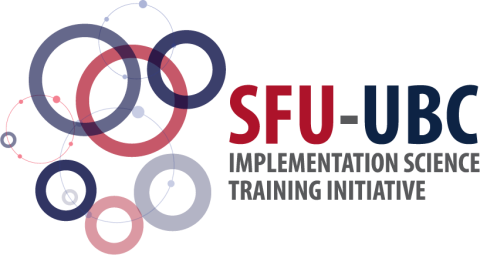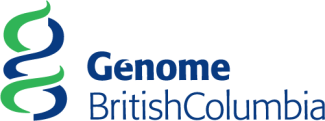
The UBC Knowledge Exchange and SFU Knowledge Mobilization units, in partnership with UBC Health and Genome BC, are thrilled to announce our mentors for the SFU-UBC Implementation Science Training Initiative. Our mentors are leaders in implementation science and will provide guidance and support throughout the program. The program's primary goal is to increase British Columbia's research capacity in implementation science by enhancing grant funding opportunities for projects led by BC-based researchers and expanding the province's network of implementation scientists.
Meet our mentors:

Dr. Bev Holmes
President and CEO, Michael Smith Health Research BC
Bev is a health research system leader with expertise and experience in and passion for the funding, production and use of research evidence to improve health. She sits on research advisory groups across Canada and internationally, is an associate editor at Implementation Science Communications and participates in the National Alliance of Provincial Health Research Organizations. An adjunct professor at SFU’s Faculty of Health Sciences and UBC’s School of Population and Public Health, Bev is also a Chartered Director (Degroote School of Business, McMaster University). She has held a number of management positions in non-profit agencies.
Bev received her MA and PhD from SFU’s School of Communication. She and partner have four children and two grandchildren; they gratefully make their homes on the traditional, unceded territory of the Coast Salish peoples, including the territories of the xʷməθkwəy̓əm (Musqueam), Səl̓ílwətaʔ/Selilwitulh (Tsleil-Waututh) and Skwxwú7mesh (Squamish) First Nations.

Dr. Linda Li
Professor and Harold Robinson/Arthritis Society Chair, Department of Physical Therapy, UBC
Senior Scientist, Arthritis Research Canada
Dr. Linda Li is Professor and Harold Robinson/Arthritis Society Chair at the Department of Physical Therapy, University of British Columbia, and Senior Scientist at Arthritis Research Canada. She also holds a Canada Research Chair in Patient-oriented Knowledge Translation.
Dr. Li’s research focuses on the integration of digital tools in rehabilitation, including the use of wearables and apps to promote physical activity in people with arthritis, and in older adults to prevent falls. Dr. Li’s work in knowledge translation and implementation science has led to a new line of studies on strategies for engaging with patients and the public in the research process. Her work has been recognized by a Distinguished Scholar Award from the Association of Rheumatology Professionals in the U.S. In 2019, she was inducted as Fellow of the Canadian Academy of Health Sciences.

Dr. Heather McKay
Professor, Faculty of Medicine, UBC
Principle Scientist, Active Aging Research Team, UBC
My research program spans the life course from childhood to old age. I am best known for: (i) health promotion: study of upstream factors (e.g. physical activity) that promote the health of children, youth and older adults; (ii) implementation science: study of design, implementation and scale-up of health promoting interventions in school (children, youth) and community (older adults) settings, and (iii) knowledge exchange: creating partnerships with community and government stakeholders to move research outcomes into action to promote health at the population level.
I lead the multidisciplinary Active Aging Research Team (AART) at UBC. My research evaluates the role of novel, scalable health promoting interventions on children’s health and on older adult health, mobility and social connectedness. I adopt an implementation science/knowledge mobilization lens to evaluate factors that influence implementation, adaptation and scale-up (dissemination) of effective health promoting interventions as a means to improve health on a population level.

Dr. Meghan Winters
Professor, Faculty of Health Sciences, SFU
CIHR Applied Public Health Chair in Gender and Sex in Healthy Cities
Researcher, Centre for Aging Smart, Vancouver Coastal Health Research Institute
Founder & Lead, Cities, Health, and Active Transportation Lab
Meghan Winters is a Professor in the Faculty of Health Sciences at Simon Fraser University. She leads the Cities, Health, and Active Transportation Lab (CHATR Lab), with a research focus on how city design impacts mobility, safety, and health, and on equity considerations within cities’ policies and plans. She and her team work with decision-makers and community groups at the intersection of health, urban planning, and transportation to generate actionable evidence and tools to shape livable, sustainable, and equitable cities. With her PHAC/CIHR Applied Public Health Chair, Meghan is building out the REACH-Cities (REsearch and ACtion for Healthy Cities) program, which aims to promote research, tools, and partnerships that foster increased gender and social equity in our cities.
Meghan leads interdisciplinary and intersectoral teams across the country working in the healthy cities space, such as the INTERACT team, and CapaCITY/E. She has been recognized with the CIHR IPPH’s Trailblazer Award, as an SFU Distinguished Professor, and was a Michael Smith Foundation for Health Research Scholar. Out of the office, Meghan aims to spend the maximum time outside, biking, camping, picnicking, and exploring with her family in tow.

Dr. Sonia Singh
Hospitalist physician and Osteoporosis Consultant, Fraser Health Authority
Clinical Assistant Professor, Faculty of Medicine, UBC
Adjunct Professor, Faculty of Health Sciences, SFU
Dr. Sonia Singh is a hospitalist physician and osteoporosis consultant in the Fraser Health Authority, based at Peace Arch Hospital in White Rock. New recipient of a five year Michael Smith Health Research BC Health Professional Investigator award, Dr. Singh has been successful with a number of research operating grants in the area of osteoporosis and fall prevention, including an Implementation Science Team grant from the Michael Smith Health Research BC for “Breaking the cycle of recurrent fracture: Scaling up a secondary fracture prevention program in Fraser Health to inform spread across British Columbia”.
She sits on the Knowledge Mobilization Platform for Osnet, a national research network supporting bone health research in Canada and holds academic appointments as Clinical Assistant Professor, Faculty of Medicine, UBC and Adjunct Professor, Faculty of Health Sciences, SFU.

Dr. Femke Hoekstra
Assistant Professor, Department of Medicine, UBC
Dr. Femke Hoekstra is an Assistant Professor at UBC’s Department of Medicine, Division of Social Medicine in the area of Implementation Science. She is also Investigator within the Centre for Chronic Disease Prevention and Management (CCDPM) at the UBC Okanagan and Associate Member of International Collaboration on Repair Discoveries (ICORD). Dr. Hoekstra holds a Doctor of Philosophy, PhD from the University of Groningen in the Netherlands, in the areas of implementation science, rehabilitation, and health promotion.
Dr. Hoekstra’s implementation science research program focuses on improving (virtual) health services and care for equity-deserving groups in rural, remote and isolated communities. Her research involves studying implementation processes of health innovations in real-world settings from different perspectives. To maximize the quality and impact of her work, she meaningfully engages research users as partners throughout the research process.

Dr. Allison Ezzat
Physiotherapist and Implementation Scientist, BC Children's Hospital Research Institute
Clinical Assistant Professor, Department of Physical Therapy, UBC
Dr Allison Ezzat is a physiotherapist and implementation scientist based at the BC Injury Research and Prevention Unit, BC Children’s Hospital Research Institute and a Clinical Assistant Professor in the Department of Physical Therapy at the University of British Columbia (UBC).
Currently funded through a Micheal Smith Health Research BC – Health Professional Investigator Award (2024-2029), Dr Ezzat’s research program applies implementation science methodologies to advance the primary prevention of knee injuries in adolescents in real-world settings. She has a special interest in reducing gender disparity for girls and women in injury risk and decreasing the long-term burden of injuries by investigating strategies for secondary prevention of knee osteoarthritis.
Dr Ezzat completed her PhD in School of Population and Public Health, UBC in 2019 investigating health outcomes in youth after knee injury. Subsequently, she completed post-doctoral work at the UBC Centre for Health Services and Policy Research and at La Trobe Sport and Exercise Medicine Research Centre, La Trobe University in Melbourne, Australia. During this time, she obtained a 2-year Graduate Certificate in Implementation Science from University of California San Francisco.

Dr. Kevin Eva
Associate Director, Centre for Health Education Scholarship
Director, Educational Research and Scholarship, UBC Department of Medicine
Dr. Kevin Eva is the associate director of the Centre for Health Education Scholarship and director of Educational Research and Scholarship in the Department of Medicine at the University of British Columbia. He completed his PhD in cognitive psychology at McMaster University in 2001 and became editor-in-chief for the journal Medical Education in 2008. He is the co-founder of the Maastricht-Canada Master of Health Professions Education program and has worked extensively with the Medical Council of Canada and College of Physicians and Surgeons of British Columbia.
Through his research programs, Dr. Eva strives to promote thoughtful approaches to the study of practical educational issues that are informed by a variety of scientific disciplines. In doing so, his aim is to encourage and support interdisciplinary collaboration for the sake of strengthening health professional education research as a scientific field of study that will improve upon educational practices and, in so doing, facilitate better health care.

Dr. Masahiro Minami
Associate Professor, SFU Faculty of Education
Dr. Masahiro Minami is an Associate Professor in the Faculty of Education at Simon Fraser University in Canada. He received extensive training in mental health services research and implementation science at the University of Exeter in Devon, UK. He specializes in developing, evaluating, and implementing complex interventions in resource-limited or compromised settings—particularly in areas affected by war, conflict, and genocide. He leads multiple grant-funded projects in Canada, Bosnia and Herzegovina, Japan, Rwanda, and the United Kingdom. He also engages in multiple consultancy roles in respective countries, and co-directs service-research centers and institutions to support communities in improving access to knowledge.
In partnership with:

